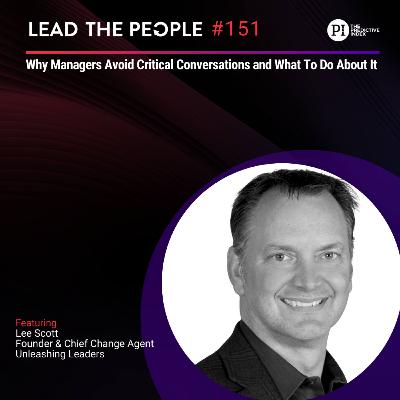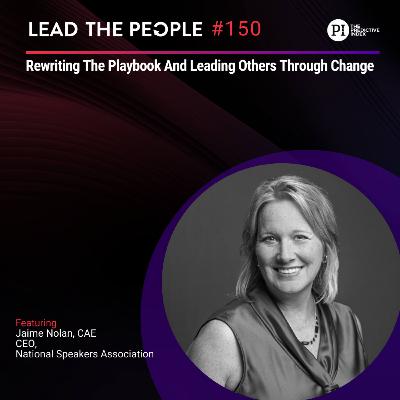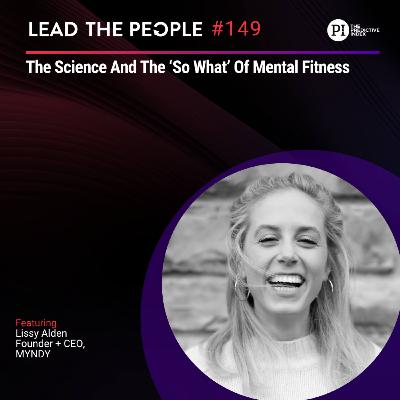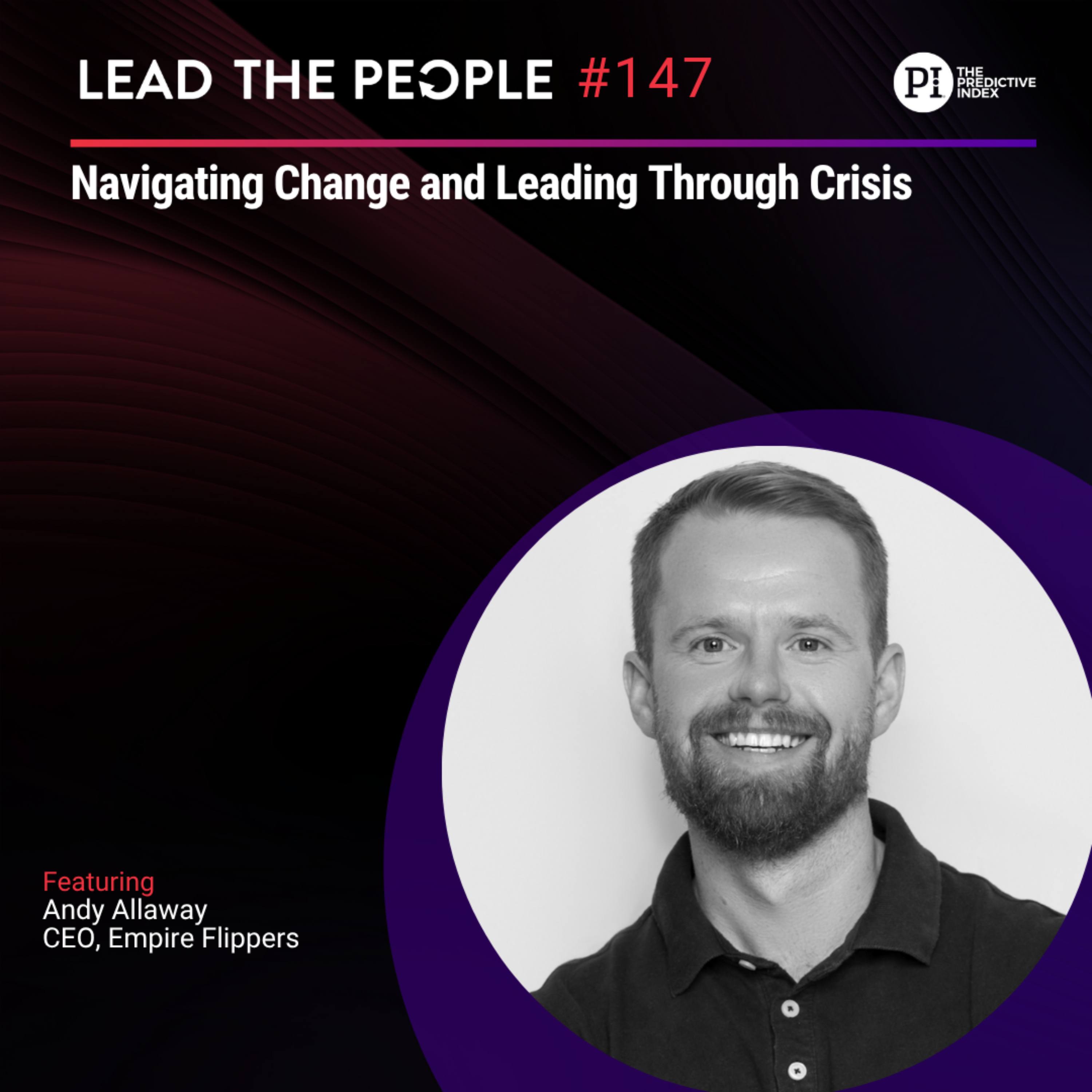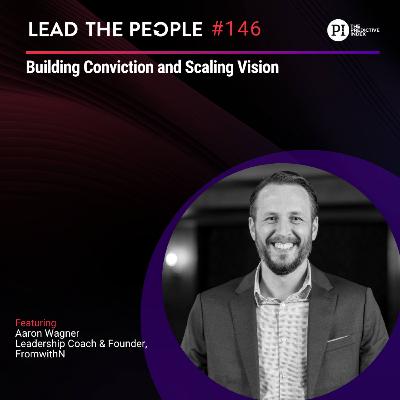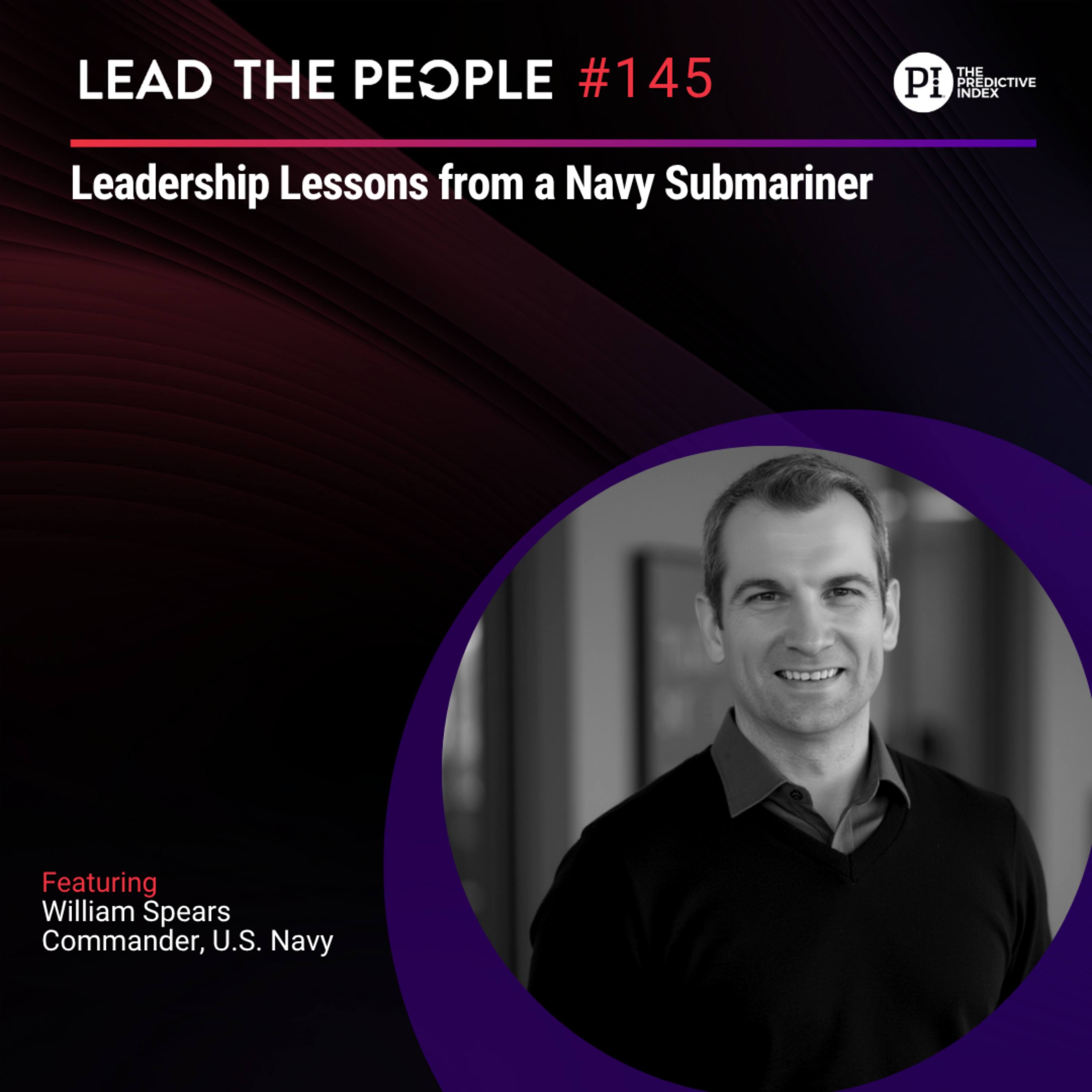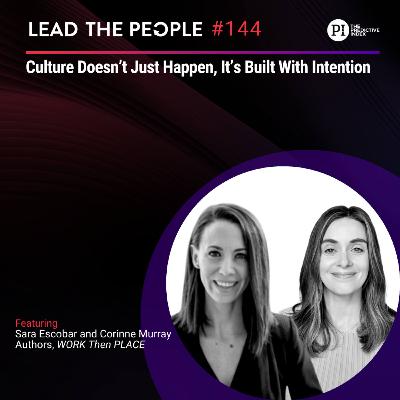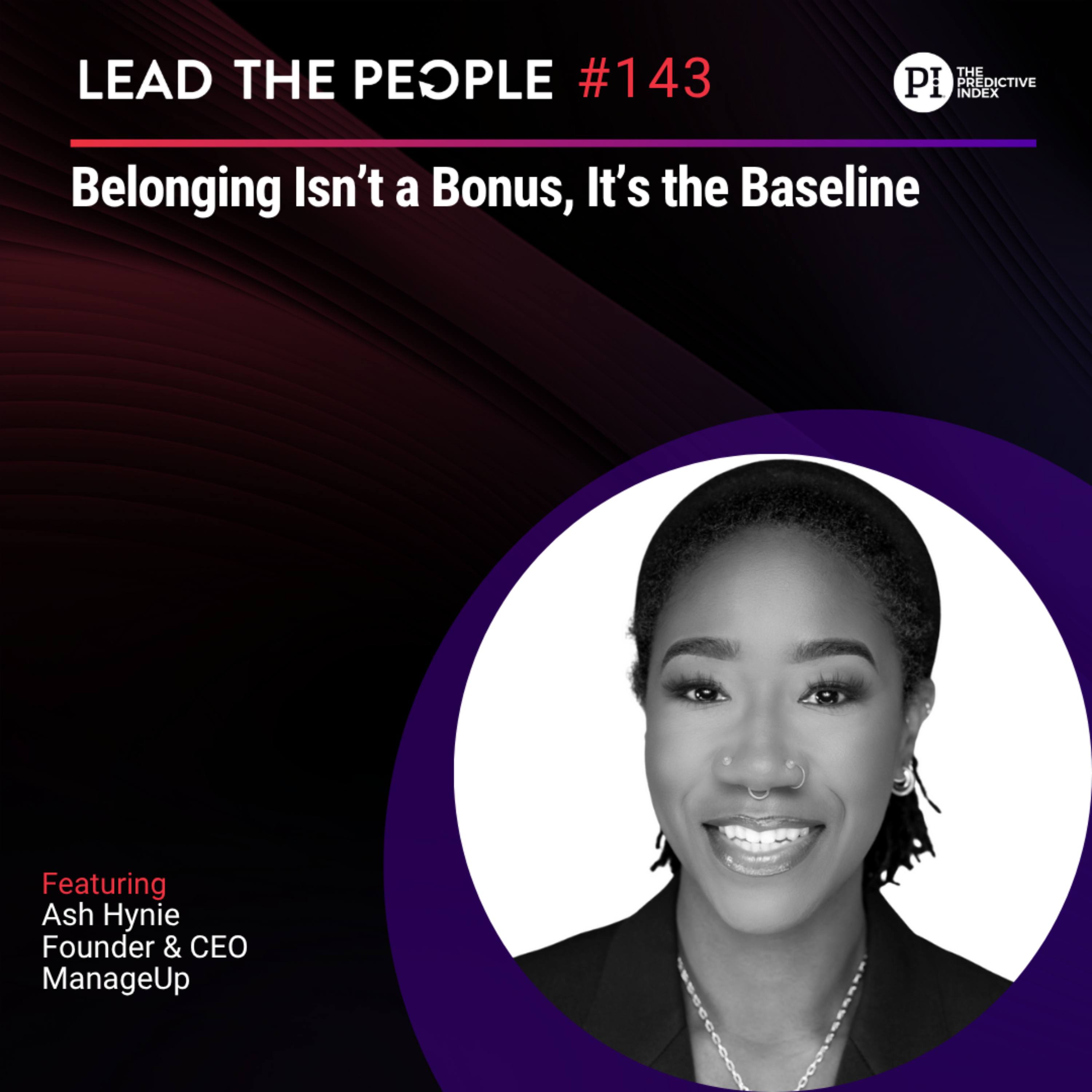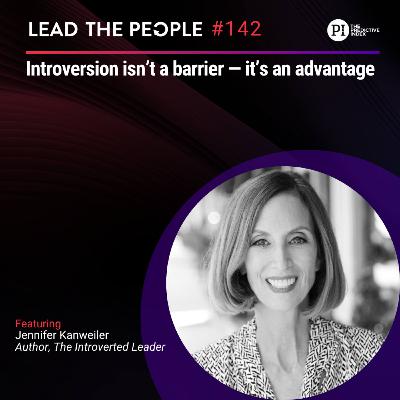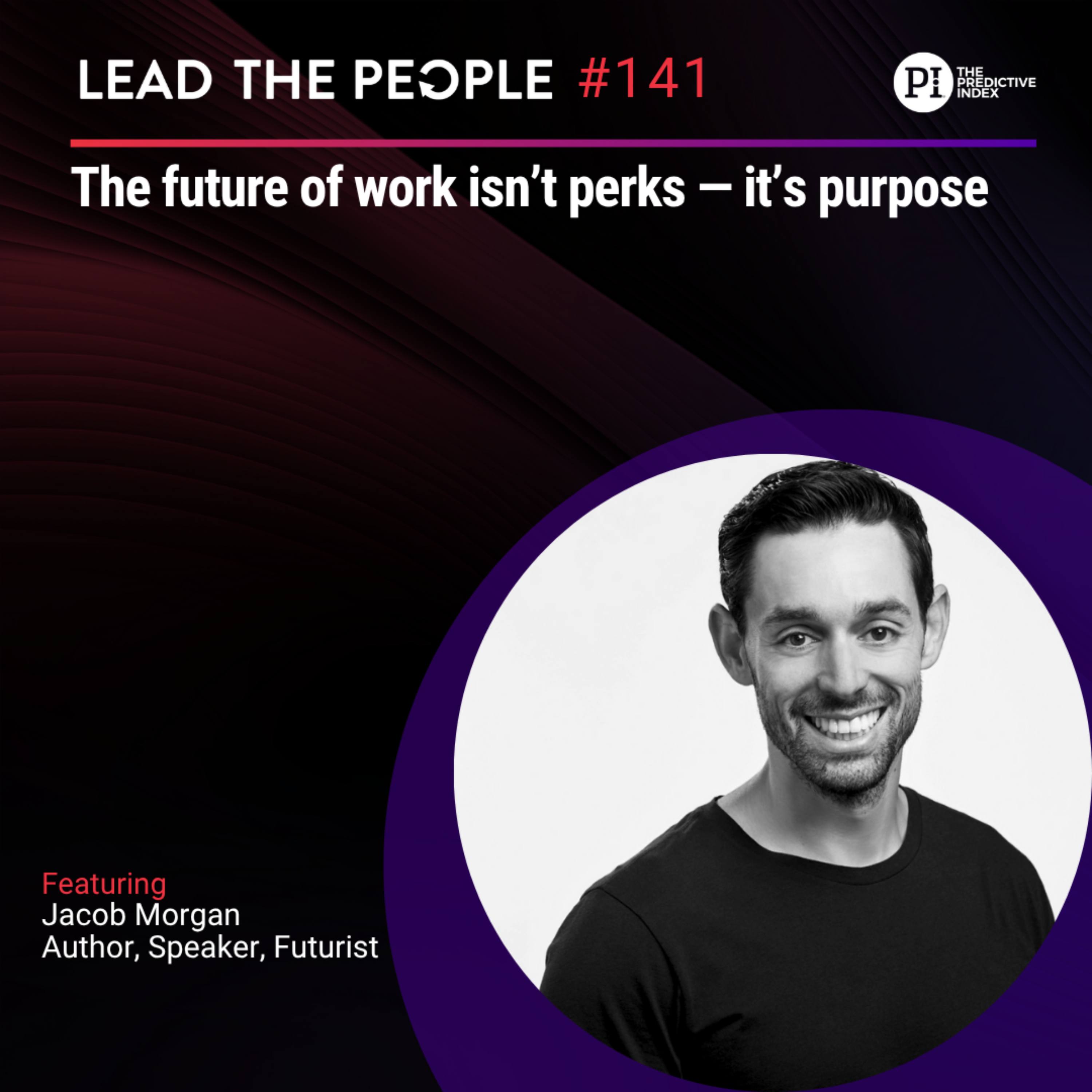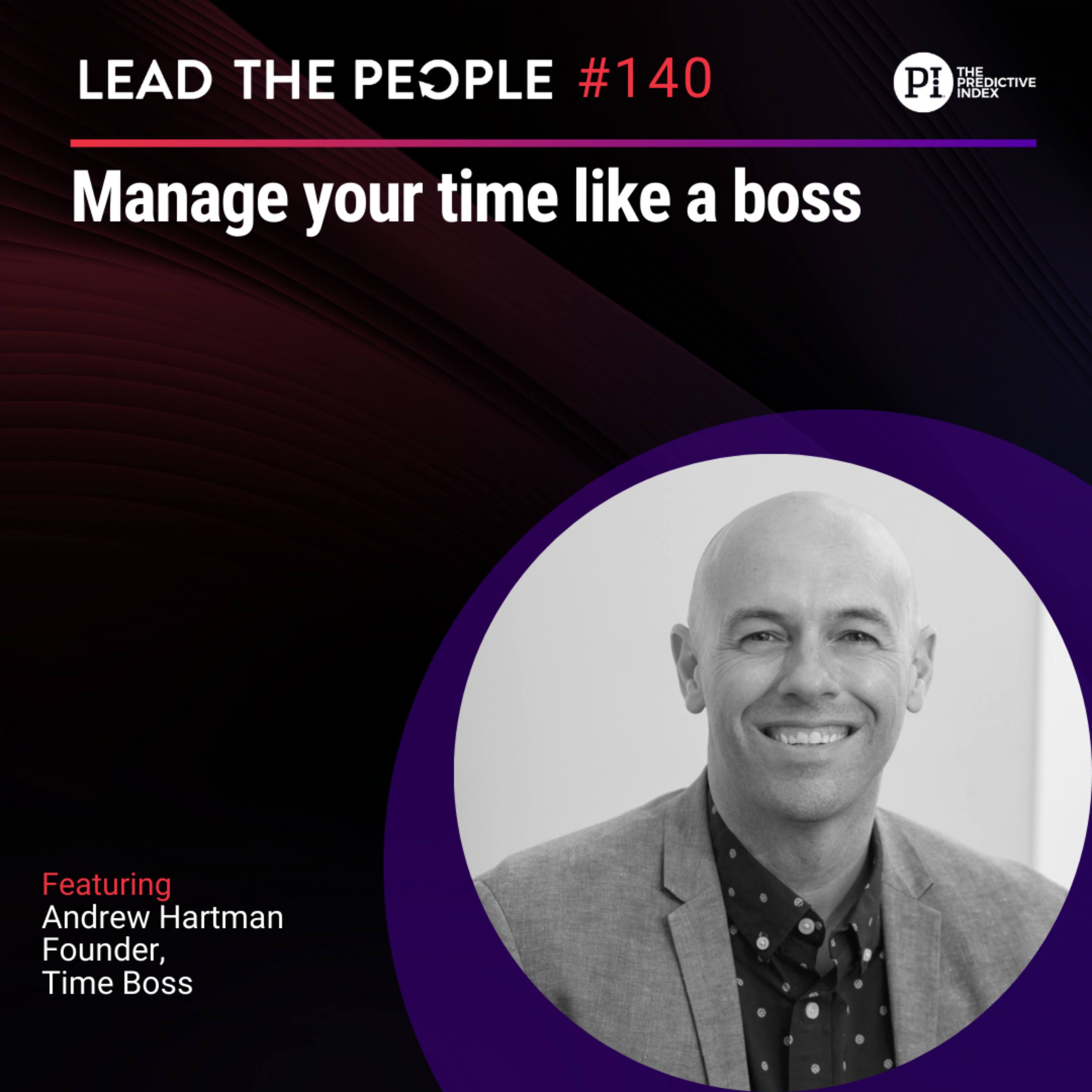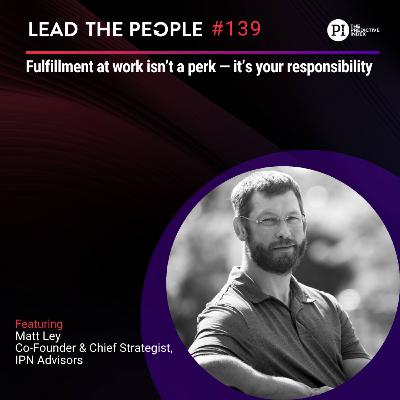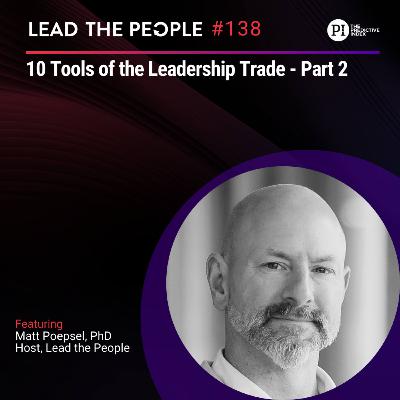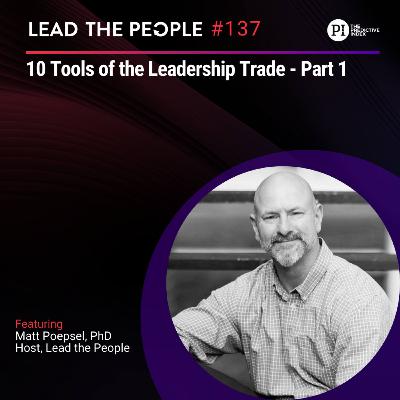Discover Lead the People
Lead the People

Lead the People
Author: Matt Poepsel, PhD
Subscribed: 11Played: 73Subscribe
Share
© 2025 Lead the People
Description
Lead The People is your guide to unlocking your true potential as an authentic leader. Hosted by Dr. Matt Poepsel—The Godfather of Talent Optimization—this podcast dives deep into the art and science of what it takes to lead at the next level. With insightful conversations and practical strategies, each episode equips executives, strategic HR pros, and aspiring leaders with the tools it takes to boost performance, inspire teams, and drive meaningful impact. Whether exploring the latest workplace trends or tackling real-world leadership challenges, Lead The People offers an enlightened approach to leadership. Embark on a rewarding journey to become the leader your people deserve—the leader you were meant to be.
159 Episodes
Reverse
Nancy Burger is a thought transformation expert, keynote speaker, and executive coach who helps leaders and teams rewire limiting thought patterns to unlock breakthrough performance. A former Wall Street banker turned professional writer, Nancy blends neuroscience, behavioral psychology, and storytelling to show how changing our inner dialog changes everything from collaboration to culture to results. Her work centers on helping leaders build awareness around emotions, replace default thought patterns with intentional choices, and create environments grounded in trust, curiosity, and growth. Through her coaching, workshops, and keynote experiences, Nancy equips executives and managers with practical tools to navigate overwhelm, challenge imposter thinking, and model vulnerability in ways that strengthen team connection and drive healthier, more sustainable performance.
Key Takeaways:
Leaders cannot control feelings, but they can choose their thoughts and responses.
Vulnerability builds trust. Ask your team “more of, less of, start, stop.”
Reframe problems as learning and growth opportunities.
Rewiring thought patterns takes consistent practice for about 2 to 6 weeks.
In difficult moments, stay curious and ask for examples before responding.
From Our Sponsor:
The Predictive Index (PI) is an award-winning talent optimization platform that aligns business strategy with people strategy for optimal business results. More than 60 years of proven science, software, and a curriculum of insightful management workshops make PI the solution for any company looking to design great teams and culture, make objective hiring decisions, foster engagement, and inspire greatness in their people anywhere in the world. More than 10,000 clients and 480+ partners use PI, including Nissan, Citizens Bank, Subway, Blue Cross Blue Shield, and Omni Hotels, across 90+ countries. Learn more at predictiveindex.com.
Additional Resources:
Nancy Burger, Speaker, Thought Transformation Expert & Executive Coach: https://www.linkedin.com/in/nancy-burger-commstrategist/
Follow Matt on LinkedIn: https://www.linkedin.com/in/mattpoepsel/
Subscribe to The Predictive Index on YouTube! https://youtube.com/@thepredictiveindex?si=zyj8aS18Z_1HMrVp
Follow PeopleForward Network on LinkedIn: https://www.linkedin.com/company/peopleforward-network/posts/?feedView=all
Learn more about PeopleForward Network: http://www.peopleforwardnetwork.com/
Malissa Clark is a Professor of industrial/organizational (I-O) psychology at the University of Georgia, where she has been on faculty since 2013. Currently, she serves as Head of the department of psychology and director of the Healthy Work Lab. Recently selected as a member of the 2024 Thinkers 50 Radar list and a finalist for the 2025 Thinkers50 Radar Award, Malissa is a recognized expert on the topics of workaholism, overwork, burnout, and employee well-being. Her first book, Never Not Working: Why the Always-On Culture Is Bad for Business and How to Fix It, was published in February 2024. Never Not Working has been recognized as one of the top management books of 2024, including being named one of Adam Grant’s 12 New Idea Books to Launch in 2024 and top 5 Porchlight Books Best Management and Workplace Culture Books of 2024.
Key Takeaways:
Workaholism is not the same as working long hours
True workaholism stems from an uncontrollable internal drive
Overworking often leads to burnout and reduced productivity
Cultural norms can glamorize unhealthy work habits
Leaders must model and support healthy boundaries
From Our Sponsor:
The Predictive Index (PI) is an award-winning talent optimization platform that aligns business strategy with people strategy for optimal business results. More than 60 years of proven science, software, and a curriculum of insightful management workshops make PI the solution for any company looking to design great teams and culture, make objective hiring decisions, foster engagement, and inspire greatness in their people anywhere in the world. More than 10,000 clients and 480+ partners use PI—including Nissan, Citizens Bank, Subway, Blue Cross Blue Shield, and Omni Hotels—across 90+ countries. Learn more at predictiveindex.com.
Additional Resources:
Malissa Clark, Author, “Never Not Working” https://a.co/d/e5HSRpd
Follow Malissa on LinkedIn: https://www.linkedin.com/in/malissa-clark-phd/
Follow Matt on LinkedIn: https://www.linkedin.com/in/mattpoepsel/
Follow PeopleForward Network on LinkedIn: https://www.linkedin.com/company/peopleforward-network/posts/?feedView=all
Learn more about PeopleForward Network: http://www.peopleforwardnetwork.com/
George Pesansky is a recognized leader in Operational Excellence, with a career spanning more than 30 years in performance optimization, executive coaching, and systematic improvement. He has trained and coached over 10,000 professionals across six continents and helped Fortune 500 companies and nonprofits alike drive measurable results.
He is the founder of Capacity2Care, a nonprofit encouraging Superperformers to donate their talent—not just their time—to improve outcomes in their communities. Known for his clarity, candor, and hands-on approach, George is now bringing his best practices to readers everywhere with Superperformance. George is also a member of Forbes Coaches Council as well as Fast Company Executive Board.
Key Takeaways:
Superperformance grows from aligning vision, strategy, and action with the people doing the work
The golden hour shows when performance peaks and how to extend it
Zero loss is about sustaining ideal performance, not perfection
Friction comes from communication gaps, variation, and rework
Studying what goes right is as important as fixing what goes wrong
From Our Sponsor:
The Predictive Index (PI) is an award-winning talent optimization platform that aligns business strategy with people strategy for optimal business results. More than 60 years of proven science, software, and a curriculum of insightful management workshops make PI the solution for any company looking to design great teams and culture, make objective hiring decisions, foster engagement, and inspire greatness in their people anywhere in the world. More than 10,000 clients and 480+ partners use PI—including Nissan, Citizens Bank, Subway, Blue Cross Blue Shield, and Omni Hotels—across 90+ countries. Learn more at predictiveindex.com.
Additional Resources:
George Pesansky, President, MyBlendedLearning.com
https://www.linkedin.com/in/deliberateimprovement/
Follow Matt on LinkedIn: https://www.linkedin.com/in/mattpoepsel/
Follow PeopleForward Network on LinkedIn: https://www.linkedin.com/company/peopleforward-network/posts/?feedView=all
Learn more about PeopleForward Network: http://www.peopleforwardnetwork.com/
In this episode, Rachel Downey shares how leaders can move from being invisible to truly influential by owning and expressing their leadership brand. Drawing from her work across creative industries and executive teams, Rachel explains why brand is more than visuals, it’s about voice, values, and showing up with clarity.
She breaks down the internal blocks that keep leaders from sharing their story, how content can scale trust, and why authenticity starts with knowing what you believe. Whether you’re leading a team or a movement, this conversation offers a practical look at building influence from the inside out.
Key Takeaways:
Your brand is how you show up whether you realize it or not.
Clarity on values and voice is the foundation of influence.
Leadership content isn’t about visibility, it’s about impact.
Vulnerability and consistency build real trust with your audience.
You can’t be influential if you’re afraid of being seen.
From Our Sponsor:
The Predictive Index (PI) is an award-winning talent optimization platform that aligns business strategy with people strategy for optimal business results. More than 60 years of proven science, software, and a curriculum of insightful management workshops make PI the solution for any company looking to design great teams and culture, make objective hiring decisions, foster engagement, and inspire greatness in their people anywhere in the world. More than 10,000 clients and 480+ partners use PI—including Nissan, Citizens Bank, Subway, Blue Cross Blue Shield, and Omni Hotels—across 90+ countries. Learn more at predictiveindex.com.
Additional Resources:
Rachel Elsts Downey, Founder & CEO, Share Your Genius: linkedin.com/in/rachelelstsdowney
Follow Matt on LinkedIn:https://www.linkedin.com/in/mattpoepsel/
Follow PeopleForward Network on LinkedIn: https://www.linkedin.com/company/peopleforward-network/posts/?feedView=all
Learn more about PeopleForward Network: http://www.peopleforwardnetwork.com/
In this episode, Elena Agaragimova explores the evolving relationship between employee engagement and performance. She challenges the idea that traditional engagement strategies are enough and makes the case for shifting toward unlocking human potential through personalization, curiosity, and strategic clarity.
Elena shares how leaders can better align people with their strengths, create space for reflection, and build workplaces that support long-term growth. From outdated career ladders to the power of story, she offers fresh insights for any leader rethinking how to develop talent in today’s world of work.
Key Takeaways:
Engagement is no longer the end goal—human performance is.
People want clarity, purpose, and to feel like they’re growing.
Personalization is key to unlocking individual and team potential.
Reflection and storytelling help people understand and own their path.
Leaders must rethink outdated systems and create space for what matters.
From Our Sponsor:
The Predictive Index (PI) is an award-winning talent optimization platform that aligns business strategy with people strategy for optimal business results. More than 60 years of proven science, software, and a curriculum of insightful management workshops make PI the solution for any company looking to design great teams and culture, make objective hiring decisions, foster engagement, and inspire greatness in their people anywhere in the world. More than 10,000 clients and 480+ partners use PI—including Nissan, Citizens Bank, Subway, Blue Cross Blue Shield, and Omni Hotels—across 90+ countries. Learn more at predictiveindex.com.
Additional Resources:
Elena Agaragimova, Co-Founder:
ShiftWell.ai website: http://www.shiftwell.ai
Follow Matt on LinkedIn: https://www.linkedin.com/in/mattpoepsel/
Follow PeopleForward Network on LinkedIn: https://www.linkedin.com/company/peopleforward-network/posts/?feedView=all
Learn more about PeopleForward Network: http://www.peopleforwardnetwork.com/
In this episode, leadership coach Lee Scott explores why so many managers avoid hard conversations and what to do about it. He shares how fear, unclear expectations, and lack of training often hold leaders back from saying what needs to be said.
Lee offers practical tools for building the courage and clarity to step into uncomfortable conversations with confidence. From naming the gap between intention and impact to creating environments where feedback is safe and expected, this conversation is a candid look at the human side of leadership growth.
Key Takeaways:
Avoiding hard conversations is often rooted in fear and self-protection.
Clarity of expectations is key to building healthy accountability.
Managers need support and practice to develop relational courage.
Feedback is most effective when it names both intent and impact.
Psychological safety starts with leaders modeling honesty and curiosity.
From Our Sponsor:
The Predictive Index (PI) is an award-winning talent optimization platform that aligns business strategy with people strategy for optimal business results. More than 60 years of proven science, software, and a curriculum of insightful management workshops make PI the solution for any company looking to design great teams and culture, make objective hiring decisions, foster engagement, and inspire greatness in their people anywhere in the world. More than 10,000 clients and 480+ partners use PI—including Nissan, Citizens Bank, Subway, Blue Cross Blue Shield, and Omni Hotels—across 90+ countries. Learn more at predictiveindex.com.
Additional Resources:
Lee Scott, Founder & Chief Change Agent, Unleashing Leaders: https://www.linkedin.com/company/unleashingleaders/
Unleashing Leaders: http://www.unleashingleaders.com
YouTube Channel: https://www.youtube.com/c/Unleashingleaders
Leadership Conversation Series (Course): https://unleashingleadersuniversity.com/leadership-conversations-series
Follow Matt on LinkedIn: https://www.linkedin.com/in/mattpoepsel/
Follow PeopleForward Network on LinkedIn: https://www.linkedin.com/company/peopleforward-network/posts/?feedView=all
Learn more about PeopleForward Network: http://www.peopleforwardnetwork.com/
In this episode, Jaime Nolan, CAE, shares her journey of transforming organizational culture, challenging outdated systems, and leading with authenticity during times of change. With deep experience in association leadership, Jaime opens up about the personal and professional work required to lead transformation from the inside out.
She reflects on what it takes to build trust across diverse communities, how to unlearn old leadership habits, and why discomfort is often the path to growth. From navigating her own identity to rewriting the playbook with purpose, Jaime’s story offers a powerful look at change, inclusion, and resilience.
Key Takeaways:
Change starts with doing your own inner work before leading others.
Trust is built slowly and requires showing up with consistency and care.
Systems don’t transform until leaders are willing to be uncomfortable.
Authenticity and vulnerability open the door to more inclusive leadership.
Rewriting the playbook means questioning what we’ve always accepted as normal.
From Our Sponsor:
The Predictive Index (PI) is an award-winning talent optimization platform that aligns business strategy with people strategy for optimal business results. More than 60 years of proven science, software, and a curriculum of insightful management workshops make PI the solution for any company looking to design great teams and culture, make objective hiring decisions, foster engagement, and inspire greatness in their people anywhere in the world. More than 10,000 clients and 480+ partners use PI—including Nissan, Citizens Bank, Subway, Blue Cross Blue Shield, and Omni Hotels—across 90+ countries. Learn more at predictiveindex.com.
Additional Resources:
Jaime Nolan, CAE, CEO, National Speakers Association: https://www.linkedin.com/in/jaimenolan/
National Speakers Association: http://www.nsaspeaker.org
Follow Matt on LinkedIn: https://www.linkedin.com/in/mattpoepsel/
Follow PeopleForward Network on LinkedIn: https://www.linkedin.com/company/peopleforward-network/posts/?feedView=all
Learn more about PeopleForward Network: http://www.peopleforwardnetwork.com/
In this episode, Lissy Alden joins the show to unpack what mental fitness really means and how it applies to leadership. She shares how mindset impacts performance, what it looks like to shift from being hijacked by emotion to intentionally choosing your response, and why self-awareness is the key to change.
Drawing from her experience supporting people leaders across industries, Lissy breaks down how reflection, mental reps, and practical tools can help interrupt old patterns and build new ones. Whether you’re feeling stuck or seeking clarity, this conversation offers simple and powerful insights for rewiring the way you think, lead, and relate.
Key Takeaways:
Mental fitness is the ability to notice, pause, and choose a different response
Most people operate on autopilot and need reflection to shift out of it
Your mindset directly affects how you lead, connect, and perform
Simple tools practiced daily can rewire deeply ingrained patterns
The goal isn’t perfection, it’s increasing self-awareness and agency
From Our Sponsor:
The Predictive Index (PI) is an award-winning talent optimization platform that aligns business strategy with people strategy for optimal business results. More than 60 years of proven science, software, and a curriculum of insightful management workshops make PI the solution for any company looking to design great teams and culture, make objective hiring decisions, foster engagement, and inspire greatness in their people anywhere in the world. More than 10,000 clients and 480+ partners use PI—including Nissan, Citizens Bank, Subway, Blue Cross Blue Shield, and Omni Hotels—across 90+ countries. Learn more at predictiveindex.com.
Additional Resources:
Follow Lissy on LinkedIn: https://www.linkedin.com/in/lissy-alden/
Follow Matt on LinkedIn: https://www.linkedin.com/in/mattpoepsel/
Follow PeopleForward Network on LinkedIn: https://www.linkedin.com/company/peopleforward-network/posts/?feedView=all
Learn more about PeopleForward Network: http://www.peopleforwardnetwork.com/
In this episode, executive coach and speaker Kelly Meerbott joins the show to explore how leaders can move from burnout and fragmentation to clarity, connection, and purpose. Drawing on her trauma-informed approach and deep experience with hundreds of C-suite leaders and military officers, Kelly offers a refreshing take on what it means to lead from within.
She discusses how to dismantle outdated leadership conditioning, why emotional clarity fuels courage, and how storytelling can unlock influence and authenticity. From co-founder conflict to middle manager fatigue, Kelly reveals how self-trust, vulnerability, and even humor can rebuild leadership from the inside out.
Key Takeaways:
Leadership starts with clarity, courage, and compassion for yourself.
Self-trust is the foundation for trusting and leading others.
Storytelling is a must-have skill for influence and connection.
Discomfort, silence, and failure are part of the leadership process.
Your power lies in unlearning who you were told to be and remembering who you are.
From Our Sponsor:
The Predictive Index (PI) is an award-winning talent optimization platform that aligns business strategy with people strategy for optimal business results. More than 60 years of proven science, software, and a curriculum of insightful management workshops make PI the solution for any company looking to design great teams and culture, make objective hiring decisions, foster engagement, and inspire greatness in their people anywhere in the world. More than 10,000 clients and 480+ partners use PI—including Nissan, Citizens Bank, Subway, Blue Cross Blue Shield, and Omni Hotels—across 90+ countries. Learn more at predictiveindex.com.
Additional Resources:
Follow Kelly on LinkedIn: https://www.linkedin.com/in/kellyameerbott/
Follow Matt on LinkedIn: https://www.linkedin.com/in/mattpoepsel/
Follow PeopleForward Network on LinkedIn: https://www.linkedin.com/company/peopleforward-network/posts/?feedView=all
Learn more about PeopleForward Network: http://www.peopleforwardnetwork.com/
In this episode, CEO Andy Allaway of Empire Flippers joins the show to unpack his journey from corporate manager to leading a fully remote, high-growth global business. Andy shares lessons on navigating hyper-growth, building culture in a distributed team, and stepping into leadership during a time of transformation.
He opens up about the challenges of succeeding a founder-led organization, the importance of hiring for cultural alignment, and what it really means to lead through downturns. From hiring missteps to rebuilding trust and clarity, Andy offers practical advice for managers leading through complexity, pressure, and change.
Key Takeaways:
You can’t scale culture without defining it clearly first.
Growth hides cracks. Downturns reveal them.
Trust is built through clarity, consistency, and communication, especially in remote teams.
Wartime leadership demands decisiveness, not consensus.
Belief in the mission is the foundation for change and resilience.
From Our Sponsor:
The Predictive Index (PI) is an award-winning talent optimization platform that aligns business strategy with people strategy for optimal business results. More than 60 years of proven science, software, and a curriculum of insightful management workshops make PI the solution for any company looking to design great teams and culture, make objective hiring decisions, foster engagement, and inspire greatness in their people anywhere in the world. More than 10,000 clients and 480+ partners use PI—including Nissan, Citizens Bank, Subway, Blue Cross Blue Shield, and Omni Hotels—across 90+ countries. Learn more at predictiveindex.com.
Additional Resources:
Follow Andy on LinkedIn: https://www.linkedin.com/in/andyallaway
Empire Flippers: http://www.empireflippers.com
Follow Matt on LinkedIn: https://www.linkedin.com/in/mattpoepsel/
Follow PeopleForward Network on LinkedIn: https://www.linkedin.com/company/peopleforward-network/posts/
Learn more about PeopleForward Network: http://www.peopleforwardnetwork.com/
Aaron Wagner is the Founder of FromwithN and a leadership coach who helps middle managers lead with clarity and confidence. With over two decades of experience in founder-led companies, he's led teams, built leadership development programs, and has turned around underperforming divisions across the country. He's passionate about helping managers grow because he has been there and has lived it. He currently coaches middle managers one-on-one, on Instagram and through his email newsletter The Managers Minute.
In this episode, he explores the power of high standards, how to separate identity from performance, and the importance of surrounding yourself with people who challenge your thinking. Aaron also opens up about how family shapes his priorities and why true leadership is about creating opportunity for others.
Key Takeaways:
Growth starts with getting radically honest with yourself.
The right people will elevate your standards and mindset.
Conviction comes from preparation and clarity.
Leadership is about building others, not just businesses.
Identity and performance are connected, but not the same.
From Our Sponsor:
The Predictive Index (PI) is an award-winning talent optimization platform that aligns business strategy with people strategy for optimal business results. More than 60 years of proven science, software, and a curriculum of insightful management workshops make PI the solution for any company looking to design great teams and culture, make objective hiring decisions, foster engagement, and inspire greatness in their people anywhere in the world. More than 10,000 clients and 480+ partners use PI—including Nissan, Citizens Bank, Subway, Blue Cross Blue Shield, and Omni Hotels—across 90+ countries. Learn more at predictiveindex.com.
Additional Resources:
Aaron Wagner, Founder, FromwithN: https://www.linkedin.com/in/aaronkwagner/
Follow Matt on LinkedIn: https://www.linkedin.com/in/mattpoepsel/
Follow PeopleForward Network on LinkedIn: https://www.linkedin.com/company/peopleforward-network/posts/?feedView=all
Learn more about PeopleForward Network: http://www.peopleforwardnetwork.com/
In this episode, Commander William C. Spears of the U.S. Navy joins the show to share leadership lessons forged under pressure, from commanding nuclear submarines to building resilient, high-performing teams.
He reflects on what it means to lead with trust, humility, and a mission-first mindset, offering tactical insights from over two decades in the Navy. Commander Spears unpacks the difference between compliance and commitment, the critical importance of psychological safety, and why character always outlasts charisma. He also explores how today’s leaders can foster accountability, push through chaos, and build cultures of excellence that outlast any one individual.
Key Takeaways:
Trust is the foundation of strong leadership.
Leaders should aim for commitment, not just compliance.
Psychological safety allows teams to think and speak freely.
Character is more lasting than charisma.
Clear plans help teams perform under pressure.
From Our Sponsor:
The Predictive Index (PI) is an award-winning talent optimization platform that aligns business strategy with people strategy for optimal business results. More than 60 years of proven science, software, and a curriculum of insightful management workshops make PI the solution for any company looking to design great teams and culture, make objective hiring decisions, foster engagement, and inspire greatness in their people anywhere in the world. More than 10,000 clients and 480+ partners use PI—including Nissan, Citizens Bank, Subway, Blue Cross Blue Shield, and Omni Hotels—across 90+ countries. Learn more at predictiveindex.com.
Additional Resources:
CDR William C. Spears
Stoicism as a Warrior Philosophy (book): https://a.co/d/1uxjZHa
Website: https://williamcspears.com
LinkedIn: http://linkedin.com/in/william-spears-89130443/
Follow Matt on LinkedIn: https://www.linkedin.com/in/mattpoepsel/
Follow PeopleForward Network on LinkedIn: https://www.linkedin.com/company/peopleforward-network/posts/?feedView=all
Learn more about PeopleForward Network: http://www.peopleforwardnetwork.com/
In this episode, workplace culture experts Sara Escobar and Corinne Murray join the show to challenge outdated ideas about culture, design, and how organizations actually function. Drawing from their experience building people-centered environments at scale, they unpack why culture isn’t a vibe; it’s a system, and how thoughtful infrastructure can transform how people show up at work.
From exploring the invisible forces that shape behavior to redefining how we think about belonging, Sara and Corinne share actionable ways leaders can co-create better ecosystems, not just experiences. They also dig into the tension between fast-moving culture and long-term change, the role of physical and digital environments, and why copying Google’s office design doesn’t make your company innovative.
Key Takeaways:
Culture needs to be intentionally designed, not left to chance.
Belonging happens when systems and behaviors align.
You cannot copy-paste another company’s culture.
Real connection requires more than just physical or digital spaces.
Sustainable change comes from small, consistent actions.
From Our Sponsor:
The Predictive Index (PI) is an award-winning talent optimization platform that aligns business strategy with people strategy for optimal business results. More than 60 years of proven science, software, and a curriculum of insightful management workshops make PI the solution for any company looking to design great teams and culture, make objective hiring decisions, foster engagement, and inspire greatness in their people anywhere in the world. More than 10,000 clients and 480+ partners use PI—including Nissan, Citizens Bank, Subway, Blue Cross Blue Shield, and Omni Hotels—across 90+ countries. Learn more at predictiveindex.com.
Additional Resources:
Read WORK Then Place: https://www.amazon.com/dp/1960299972
Follow Sara on LinkedIn: https://www.linkedin.com/in/saraescoux/
Follow Corinne on LinkedIn: https://www.linkedin.com/in/corinnejmurray/
Follow Matt on LinkedIn: https://www.linkedin.com/in/mattpoepsel/
Follow PeopleForward Network on LinkedIn: https://www.linkedin.com/company/peopleforward-network/posts/?feedView=all
Learn more about PeopleForward Network: http://www.peopleforwardnetwork.com/
In this episode, ManageUp founder and CEO Ash Hynie joins the show to rehumanize the way we think about leadership, feedback, and performance. With a background in culinary arts, engineering, and HR, Ash shares how her journey shaped a people-first approach to leadership.
She explains how many managers are promoted without preparation, and how systemic issues like bias and lack of visibility hold employees back. From “last in, first out” layoffs to recency bias in performance reviews, Ash explores how tech can help managers make fairer, faster decisions. Using real-time data and contextual insights, ManageUp supports feedback that aligns with both company values and individual growth.
Key Takeaways:
Many managers are promoted without preparation or support
Feedback works best when it’s timely and practical
AI helps reduce bias and surface hidden impact
Promotions reward visibility, not always contribution
Marginalized groups are being laid off at record rates
From Our Sponsor:
The Predictive Index (PI) is an award-winning talent optimization platform that aligns business strategy with people strategy for optimal business results. More than 60 years of proven science, software, and a curriculum of insightful management workshops make PI the solution for any company looking to design great teams and culture, make objective hiring decisions, foster engagement, and inspire greatness in their people anywhere in the world. More than 10,000 clients and 480+ partners use PI—including Nissan, Citizens Bank, Subway, Blue Cross Blue Shield, and Omni Hotels—across 90+ countries. Learn more at predictiveindex.com.
Additional Resources:
Ash Hynie, Founder & CEO, ManageUP: https://www.linkedin.com/in/ash-hynie/
ManageUp: http://www.manageup.com/
Follow Matt on LinkedIn: https://www.linkedin.com/in/mattpoepsel/
Follow PeopleForward Network on LinkedIn: https://www.linkedin.com/company/peopleforward-network/posts/?feedView=all
Learn more about PeopleForward Network: http://www.peopleforwardnetwork.com/
In this episode, bestselling author and introvert-at-work expert Jennifer Kahnweiler joins the show to reframe how we think about leadership, presence, and performance in the workplace. Drawing from her updated book The Introverted Leader and years of coaching introverted professionals, Jennifer pushes back on the extrovert-biased norms that dominate many workplaces, from meeting culture to hiring and promotion.
She makes the case for creating introvert-friendly environments, where silence isn’t mistaken for disengagement and preparation is treated as a strength. From her 4 Ps framework (Prepare, Presence, Push, Practice) to strategies for balancing team energy, Jennifer shares research-backed insights and practical tactics for managers and individual contributors alike.
Key Takeaways:
Introverts lead best when they can prepare and reflect.
Simple tools like agendas and breakouts create inclusion.
Bias, not ability, often holds introverts back.
The 4 Ps help introverts lead with confidence.
Trust starts with 1:1 connection and thoughtful design.
From Our Sponsor:
The Predictive Index (PI) is an award-winning talent optimization platform that aligns business strategy with people strategy for optimal business results. More than 60 years of proven science, software, and a curriculum of insightful management workshops make PI the solution for any company looking to design great teams and culture, make objective hiring decisions, foster engagement, and inspire greatness in their people anywhere in the world. More than 10,000 clients and 480+ partners use PI—including Nissan, Citizens Bank, Subway, Blue Cross Blue Shield, and Omni Hotels—across 90+ countries. Learn more at predictiveindex.com.
Additional Resources:
Jennifer Kahnweiler's Book: https://www.amazon.com/Introverted-Leader-3rd-Building-Strength/dp/B0DHWS7K35
LinkedIn: https://www.linkedin.com/in/jenniferkahnweiler/
Website: https://jenniferkahnweiler.com/
Follow Matt on LinkedIn: https://www.linkedin.com/in/mattpoepsel/
Follow PeopleForward Network on LinkedIn: https://www.linkedin.com/company/peopleforward-network/posts/
Learn more about PeopleForward Network: http://www.peopleforwardnetwork.com/
In this episode, futurist, bestselling author, and keynote speaker Jacob Morgan joins the show to challenge today’s assumptions about employee experience. Drawing from his new book, “The 8 Laws of Employee Experience”, Jacob argues that work has drifted into entitlement culture, where accountability is low, standards are blurred, and perks have replaced purpose.
He makes the case for a reset: employee experience is not about yoga rooms or snack bars, but about the mutual exchange of value between people and organizations. From the dangers of abandoning accountability to the need for cultural clarity and resilience, Jacob shares the principles leaders must return to if they want to build future-ready companies.
Key Takeaways:
Employee experience is about mutual value exchange, not perks .
Standards, accountability, and responsibility must return to the workplace.
Perks like wellness programs can’t replace strong leadership and growth opportunities.
Culture succeeds when it has clarity and consistency, not when it tries to please everyone.
The future of work demands resilience, maturity, and purpose at the center.
From Our Sponsor:
The Predictive Index (PI) is an award-winning talent optimization platform that aligns business strategy with people strategy for optimal business results. More than 60 years of proven science, software, and a curriculum of insightful management workshops make PI the solution for any company looking to design great teams and culture, make objective hiring decisions, foster engagement, and inspire greatness in their people anywhere in the world. More than 10,000 clients and 480+ partners use PI—including Nissan, Citizens Bank, Subway, Blue Cross Blue Shield, and Omni Hotels—across 90+ countries. Learn more at predictiveindex.com.
Additional Resources:
Jacob's book The 8 Laws of Employee Experience: https://www.amazon.com/Employee-Experience-Advantage-Jacob-Morgan/dp/1394273991/
Jacob's website: https://thefutureorganization.com/
Follow Matt on LinkedIn: https://www.linkedin.com/in/mattpoepsel/
Follow PeopleForward Network on LinkedIn: https://www.linkedin.com/company/peopleforward-network/posts/
Learn more about PeopleForward Network: http://www.peopleforwardnetwork.com/
In this episode, Andrew Hartman, founder of Time Boss, joins the show to challenge the way leaders think about time. Drawing from his own burnout and breakthrough, Andrew reveals how high-achieving professionals can reclaim control of their calendar, emotional margin, and ultimately their impact not by doing more but by leading themselves better.
He introduces a powerful reframe: stop treating time like credit and start treating it like cash. From commitment plans and chaos buffering to becoming a better boss to your future self, Andrew gives leaders a practical playbook to shift from overwhelm to sustainable, energized performance.
Key Takeaways:
Leaders must stop treating time like credit and start budgeting it like cash.
Emotional margin is created by making commitment plans not by getting to the bottom of your to-do list.
Overextending yourself doesn’t mean more results; it often leads to cognitive overload and diminished decision-making.
Delegating, deferring, and chaos-blocking are essential to managing the unpredictable nature of leadership.
You are the boss of your future self so lead accordingly and with intention.
From Our Sponsor:
The Predictive Index (PI) is an award-winning talent optimization platform that aligns business strategy with people strategy for optimal business results. More than 60 years of proven science, software, and a curriculum of insightful management workshops make PI the solution for any company looking to design great teams and culture, make objective hiring decisions, foster engagement, and inspire greatness in their people anywhere in the world. More than 10,000 clients and 480+ partners use PI—including Nissan, Citizens Bank, Subway, Blue Cross Blue Shield, and Omni Hotels—across 90+ countries. Learn more at predictiveindex.com.
Additional Resources:
Follow Andrew on LinkedIn: https://www.linkedin.com/in/andrewhartman/
Follow Matt on LinkedIn: https://www.linkedin.com/in/mattpoepsel/
Follow PeopleForward Network on LinkedIn: https://www.linkedin.com/company/peopleforward-network/
Learn more about PeopleForward Network: http://www.peopleforwardnetwork.com/
In this episode, Matt Ley, Co-Founder of IPN Advisors and author of Manage Your Gaps, joins the show to explore how fulfillment, energy, and effective management intersect to drive purpose and performance.
He shares how his concept of Fulfillment ROI helps leaders and teams track the energy they invest and the value they receive, revealing simple shifts that can lead to more meaningful, energized work. From his EPIC management model to redefining the difference between rock stars and rising stars, Matt offers a fresh take on what it means to lead well, stay grounded, and thrive in your role.
Key Takeaways:
Fulfillment happens when the value you get from work outweighs the energy you put in.
Tracking daily energy and value reveals patterns that affect motivation and burnout.
The EPIC model helps managers create clarity, alignment, and momentum.
Leaders should support both rising stars chasing growth and rock stars who thrive in their current role.
Management isn’t about doing more. It’s about enabling others to create more value.
From Our Sponsor:
The Predictive Index (PI) is an award-winning talent optimization platform that aligns business strategy with people strategy for optimal business results. More than 60 years of proven science, software, and a curriculum of insightful management workshops make PI the solution for any company looking to design great teams and culture, make objective hiring decisions, foster engagement, and inspire greatness in their people anywhere in the world. More than 10,000 clients and 480+ partners use PI—including Nissan, Citizens Bank, Subway, Blue Cross Blue Shield, and Omni Hotels—across 90+ countries. Learn more at predictiveindex.com.
Additional Resources:
Matt Ley | Co-Founder, IPN Advisors & Author, “Manage Your Gaps”: https://www.linkedin.com/in/mattley/
https://www.ipnadvisors.com/
Follow Matt on LinkedIn: https://www.linkedin.com/in/mattpoepsel/
Follow PeopleForward Network on LinkedIn: https://www.linkedin.com/company/peopleforward-network/posts/?feedView=all
Learn more about PeopleForward Network: http://www.peopleforwardnetwork.com/
After years of hosting this podcast and interviewing incredible leaders, I've identified the tools that solve the most common manager challenges: lack of time, uncertainty about doing things right, and feeling constantly behind.
#6: BetterUp - Develop People Proactively A scalable coaching platform that helps managers develop both themselves and their direct reports through professional coaching technology, creating accountability and boosting follow-through. https://betterup.com
#7: Ramp - Streamline Financial Management An expense management platform that automates financial tasks, saving precious leadership time by making expense tracking painless and preserving time for people-focused activities. https://ramp.com
#8: Miro - Communicate Visually An unlimited canvas collaboration tool that transforms meetings through visual brainstorming, levels the playing field for all team members, and works seamlessly across remote, hybrid, and in-person settings. https://miro.com
#9: Zapier - Automate Routine Tasks An integration platform that connects hundreds of tools, automating repetitive tasks and enabling leaders to focus on personal branding and strategic relationship building. https://zapier.com
#10: Reclaim.ai - Master Your Calendar A time management tool that syncs multiple calendars, provides productivity analytics, and transforms your calendar from foe to friend through intelligent scheduling and automated time blocking. https://reclaim.ai
Be sure to check out tools 1-5 in my last episode!
From Our Sponsor:
The Predictive Index (PI) is an award-winning talent optimization platform that aligns business strategy with people strategy for optimal business results. More than 60 years of proven science, software, and a curriculum of insightful management workshops make PI the solution for any company looking to design great teams and culture, make objective hiring decisions, foster engagement, and inspire greatness in their people anywhere in the world. More than 10,000 clients and 480+ partners use PI—including Nissan, Citizens Bank, Subway, Blue Cross Blue Shield, and Omni Hotels—across 90+ countries. Learn more at predictiveindex.com.
Additional Resources:
Follow Matt on LinkedIn: https://www.linkedin.com/in/mattpoepsel/
Follow PeopleForward Network on LinkedIn: https://www.linkedin.com/company/peopleforward-network/posts/?feedView=all
Learn more about PeopleForward Network: http://www.peopleforwardnetwork.com/
After years of hosting this podcast and interviewing incredible leaders, I've identified the tools that solve the most common manager challenges: lack of time, uncertainty about doing things right, and feeling constantly behind.
Todoist - Master Your Time and Tasks A comprehensive task management system that transforms chaos into controlled productivity through recurring tasks, cross-device sync, and seamless calendar integration. https://todoist.com
MasterClass - Invest in Continuous Learning An online learning platform offering world-class instruction that helps leaders become well-rounded humans, not just better businesspeople. https://masterclass.com
Spring Health - Prioritize Team Mental Health A comprehensive mental health platform that enables proactive rather than reactive approaches to workplace wellbeing and team support. https://springhealth.com
Prezzee - Build a Recognition-Rich Culture A flexible employee recognition platform that converts appreciation into personalized gift cards from 360+ brands, making meaningful recognition both easy and impactful. https://prezzee.com
Canva - Create Winning Presentations A design platform that empowers leaders to become visual storytellers without requiring design skills, perfect for presentations, social media, and team communications. https://canva.com
Stay tuned for tools 6-10 in my next episode!
From Our Sponsor:
The Predictive Index (PI) is an award-winning talent optimization platform that aligns business strategy with people strategy for optimal business results. More than 60 years of proven science, software, and a curriculum of insightful management workshops make PI the solution for any company looking to design great teams and culture, make objective hiring decisions, foster engagement, and inspire greatness in their people anywhere in the world. More than 10,000 clients and 480+ partners use PI—including Nissan, Citizens Bank, Subway, Blue Cross Blue Shield, and Omni Hotels—across 90+ countries. Learn more at predictiveindex.com.
Additional Resources:
Follow Matt on LinkedIn: https://www.linkedin.com/in/mattpoepsel/
Follow PeopleForward Network on LinkedIn: https://www.linkedin.com/company/peopleforward-network/posts/?feedView=all
Learn more about PeopleForward Network: http://www.peopleforwardnetwork.com/







